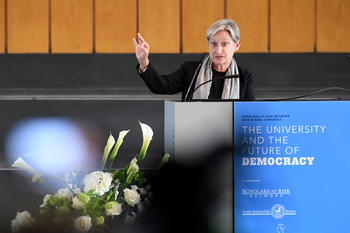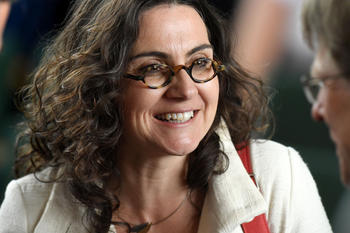Freedom for research
American philosopher and literary scholar Judith Butler and Turkish sociologist Nil Mutluer delivered the opening speeches at the international Scholars at Risk network conference at Freie Universität.
Jun 26, 2018
Judith Butler said that Universities that don’t defend themselves against attacks from outside lose their integrity.
Image Credit: David Ausserhofer
Nil Mutluer is one of many Turkish researchers who are continuing their work in exile.
Image Credit: David Ausserhofer
In January 2016, Nil Mutluer was the head of the Institute of Sociology at Nişantaşı University, in Istanbul. Just one month later, she lost her position as a professor by presidential decree because she had joined more than 2,000 other members of the Turkish academic and research community in participating in the “Academics for Peace” petition. The group had called on the Turkish government – peacefully, but in clear terms – to end the war in the Kurdish areas of Turkey.
Because she had signed the petition, Mutluer was accused of terrorism. Many others lost their jobs or were arrested. She left Turkey in July 2016. Mutluer’s story is just one example of how scholars, scientists, and researchers come under political pressure worldwide.
The latest report from the international Scholars at Risk network documents more than 250 incidents in 35 countries in just one year, from physical violence to murder, in countries including Syria, Venezuela, and China. Scholars at Risk helps scholars, scientists, and researchers who are at risk in their home countries find refuge in other countries, but that isn’t all. The network also helps them continue their work at another institution.
The three-day international conference, which was co-organized by the Alexander von Humboldt Foundation and Freie Universität Berlin, brought 600 scholars and scientists from more than 70 countries together on the campus in Dahlem. The goal was to raise public awareness, in free and democratic societies, of threats to academic freedom.
Opening speaker Judith Butler, a professor at the Department of Comparative Literature at the University of California, Berkeley, called on universities the world over to live up to their special responsibilities for defending democratic values: “Those who are forced to leave their countries,” Butler said at the Max Kade Auditorium, “not only lose a position of employment, but also their ability to work in their own language and their place in an academic community that they have worked for all their lives.”
Protecting freedom of academic endeavor
Butler pointed out that the university is tasked with creating the environment needed for independent research and thought. That in turn means that those who do research and teach at a university must be protected against malicious interference if the university wishes to live up to its ideals as a refuge for free exchange and free thinking: “Universities that don’t defend themselves against external attacks lose their integrity,” Butler said.
In democratic societies, she pointed out, academic freedom also includes the possibility of making statements critical of the government or the state – without having to fear sanctions afterward. Butler urged universities to guard not just against the state, but also against profit-oriented, ideological, and religious special interests, which she said was the only way the university could be a place where scholars could argue over the truth and appear publicly, undisturbed by external influences.
In authoritarian countries, it is often the case that calls for freedom are reinterpreted as incitement to violence and calls for peace as terrorism. “It could be a syllabus, a topic of a dissertation thesis, or a political position that brings down the wrath of the state,” Butler cautioned. Harassment, police brutality, censorship, surveillance, being banned from the profession, travel restrictions, and imprisonment can follow, threatening scholars’ livelihoods or even their very lives. Butler recalled the example of a group of Brazilian students who faced death threats in November 2017 for a feminist research project, and that of Mohamed Habibi, an Iranian “whose support of teacher unionization landed him in prison.”
Philipp Schwartz fellowship to continue research
“Who can say with any measure of certainty that today’s safe havens will always remain safe?” Nil Mutluer asked conference attendees. Thanks to a Philipp Schwartz fellowship from the Alexander von Humboldt Foundation, Mutluer can now continue her sociology research at Humboldt-Universität zu Berlin for two years. The fellowship is named for a Jewish pathologist who had to leave Germany, fleeing the Nazis, in 1933. In Switzerland, he founded an organization called the “Zentralberatungsstelle für deutsche Gelehrte,” or “Central Advisory Office for German Scholars,” (later: “Notgemeinschaft deutscher Wissenschaftler im Ausland” – “Emergency Assistance Association for German Scientists“) which helped victims of Nazi persecution to flee to Turkey – the very country where thousands of scholars face repression today.
Freie Universität was the first German university to join the Scholars at Risk network, in 2011. In its role as an international network university that was founded nearly 70 years ago with great American support, the university is under an obligation to return the trust and capital invested in it, said Klaus Hoffmann-Holland, one of the university’s vice presidents. Hoffmann-Holland stressed that the university, whose motto includes the term “liberty,” lives up to its responsibility to help scholars who cannot do their research in freedom through its engagement in SAR. At present, Freie Universität hosts four threatened scholars. Ernst-Reuter-Gesellschaft der Freunde und Förderer und Ehemaligen der Freien Universität Berlin e.V. has launched a campaign to allow two scholars at risk to stay at Freie Universität per year over the next five years (for more information, see the info box below).
Further Information
To mark the university’s 70th anniversary year, Ernst-Reuter-Gesellschaft der Freunde, Förderer und Ehemaligen der Freien Universität Berlin e. V. has launched a donation drive. The goal is to allow two scholars at risk to stay at Freie Universität per year over the next five years, thereby giving them a place and the time to continue their scholarly work – in freedom, and without fear of reprisals. The association requests your support with this. You can donate via the Startnext crowdfunding platform. Every euro reaches its intended recipient, and every euro counts!


